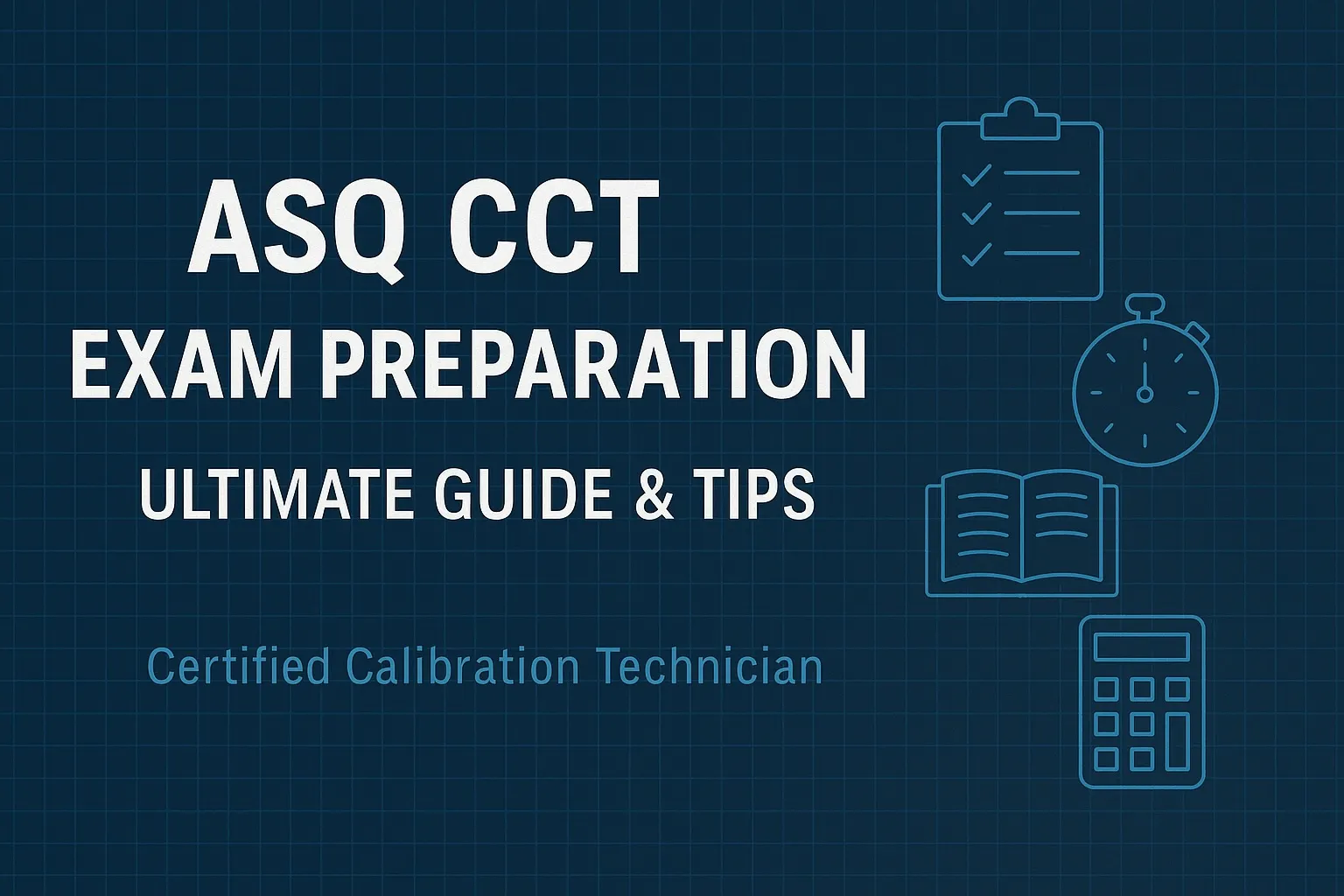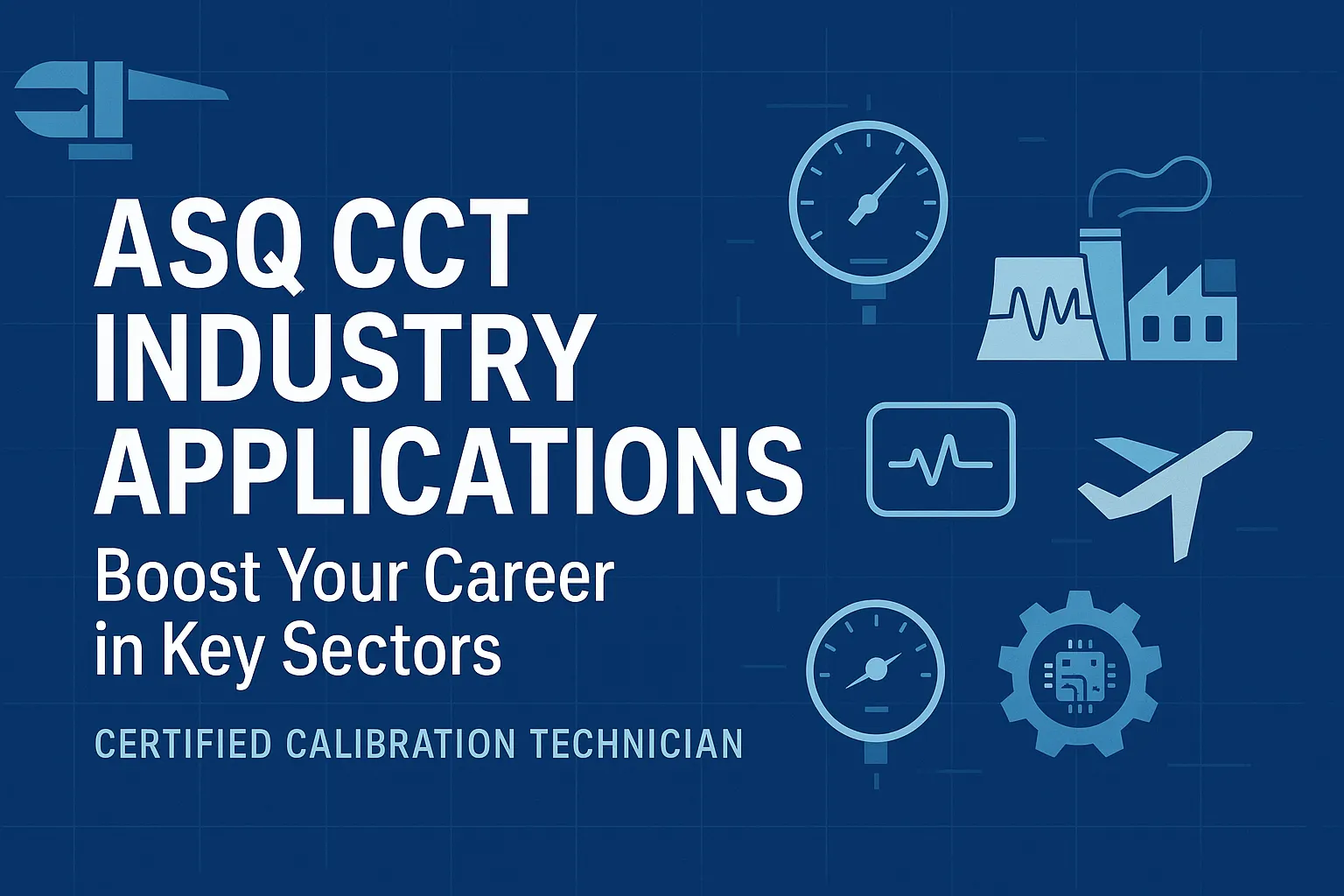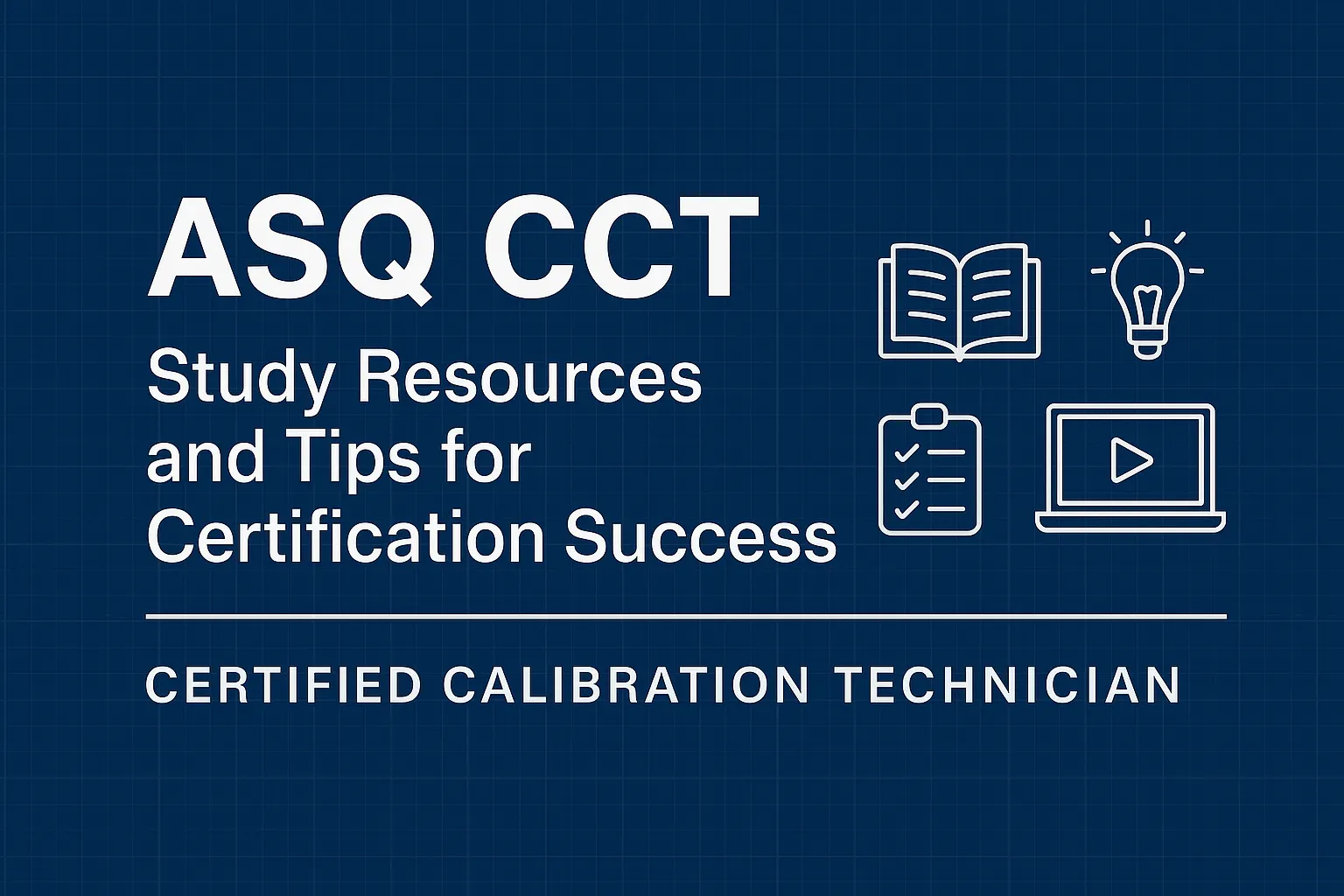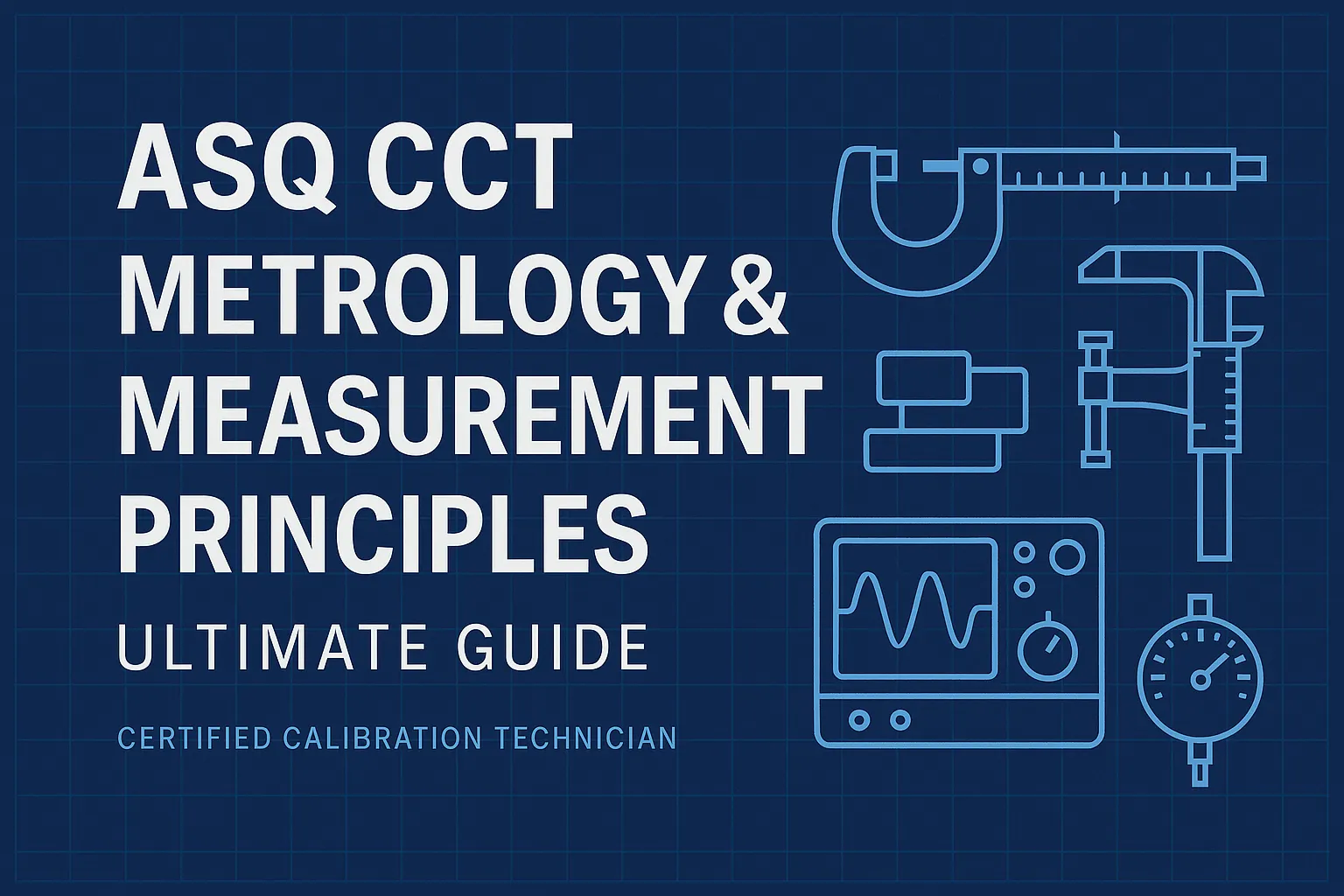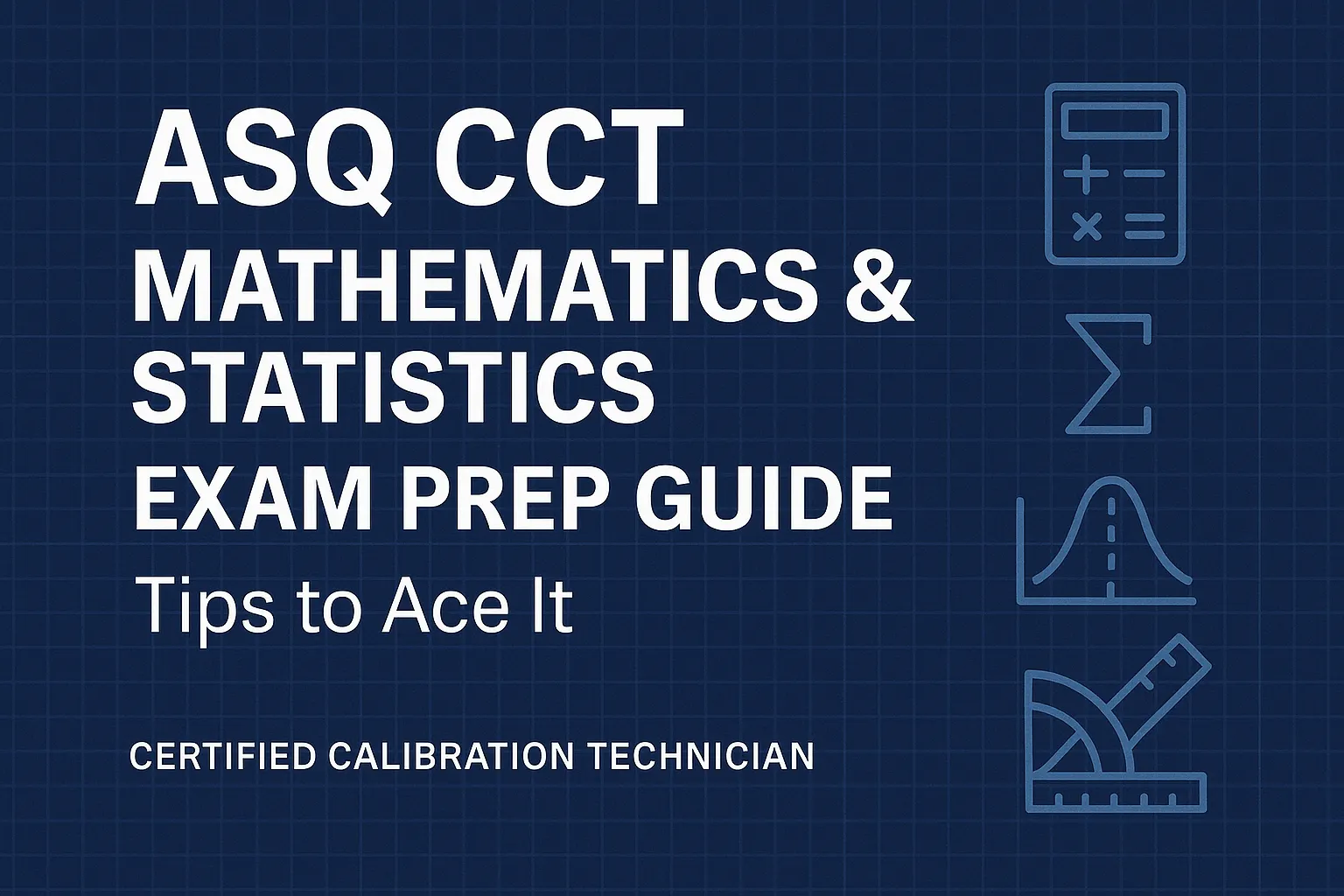ASQ CCT Study Resources and Tips for Certification Success
Are you aiming to become an ASQ Certified Calibration Technician (CCT)? You've come to the right place. Earning this certification boosts your career in quality assurance and metrology, proving your expertise in calibration processes and standards. But preparing for the ASQ CCT exam demands the right strategy and resources to succeed on your first try.
In this guide, you'll discover top-notch ASQ CCT study resources that fit your learning style, from official handbooks to online courses and practice tests. We'll also share proven tips to streamline your preparation, helping you manage time effectively and focus on key topics like measurement uncertainty and instrument calibration.
Get ready to transform your study routine into a confident path toward certification. Let's dive in and equip you with everything you need.
Understanding the ASQ CCT Certification
You pursue the ASQ Certified Calibration Technician (CCT) certification to validate your expertise in calibrating measurement instruments. This credential, offered by the American Society for Quality (ASQ), equips you with skills in metrology, quality assurance, and precision measurement.
What the Certification Entails
ASQ CCT focuses on core competencies like instrument calibration, measurement uncertainty, and traceability standards. You apply these in industries such as manufacturing, aerospace, and pharmaceuticals. For instance, you calibrate devices like micrometers, gauges, and oscilloscopes to ensure accuracy.
Eligibility Criteria
You qualify for the CCT exam with 5 years of on-the-job experience in calibration or metrology. ASQ reduces this to 3 years if you hold a technical degree or certification. Check the official ASQ website for full details (asq.org).
Exam Format and Content
The CCT exam consists of 135 multiple-choice questions over 4.5 hours. Topics cover 6 domains: general metrology (20%), measurement systems (18%), calibration systems (22%), uncertainty (15%), quality systems (15%), and applied mathematics (10%). ASQ reports a pass rate of around 70% for first-time takers, based on 2022 data.
DomainPercentage of ExamKey TopicsGeneral Metrology20%Units, standards, traceabilityMeasurement Systems18%Gage R&R, error sourcesCalibration Systems22%Procedures, records, intervalsUncertainty15%Budgets, calculationsQuality Systems15%Audits, documentationApplied Mathematics10%Statistics, conversions
Benefits for Your Career
You advance your career with CCT by accessing roles like calibration specialist or quality engineer. Employers value this certification, with ASQ surveys showing certified professionals earn 15-20% higher salaries than non-certified peers. You build confidence in handling complex calibration tasks, enhancing your contributions to organizational accuracy and compliance.
Essential ASQ CCT Study Resources
You access top-tier materials to master ASQ CCT exam topics like measurement uncertainty and instrument calibration. These resources build on your preparation strategies and enhance your calibration expertise for certification success.
Official ASQ Materials and Handbooks
Access the ASQ CCT Body of Knowledge directly from the ASQ website for a comprehensive outline of exam domains. Download the official CCT Handbook, which details 135 questions across six areas including traceability standards and calibration procedures. Use ASQ's sample questions and glossaries to reinforce core concepts in metrology.
Recommended Books and Guides
Purchase "The Metrology Handbook" by Jay L. Bucher for in-depth coverage of measurement principles and uncertainty calculations. Read "Calibration: A Technician's Guide" by Mike Cable to learn practical techniques for instrument calibration in manufacturing settings. Explore "Handbook of Dimensional Measurement" by Francis T. Farago for insights into precision tools and standards.
Online Courses and Webinars
Enroll in ASQ's official CCT preparation course on their learning platform, which covers all exam domains with interactive modules. Join webinars from Fluke Calibration on topics like traceability and error analysis, available free on their site. Take Coursera's "Measurement Systems Analysis" course to build skills in uncertainty and calibration, with 20 hours of video content and quizzes.
Proven Study Tips for ASQ CCT Success From AlphaTC
You gain an edge in ASQ CCT certification with proven tips from AlphaTC experts. These strategies build on essential resources like the ASQ CCT Body of Knowledge and official handbooks to ensure your exam readiness.
Creating an Effective Study Plan
You create an effective study plan by assessing your current knowledge in core areas like measurement uncertainty and instrument calibration. Divide the ASQ CCT Body of Knowledge into six domains and allocate 4-6 weeks per domain for focused review. Schedule daily sessions of 2 hours that include reading from "The Metrology Handbook" and applying concepts to real-world scenarios in manufacturing. Track progress with weekly self-assessments to identify weak spots in traceability standards. Adjust your plan based on practice test results if you score below 70% in any domain.
Practicing with Mock Exams
You practice with mock exams to simulate the ASQ CCT test environment of 135 multiple-choice questions. Access free mock tests from ASQ's website and premium ones from AlphaTC's platform that mirror the exam's six domains. Time yourself for 4 hours during each session to build stamina and accuracy. Review incorrect answers immediately and note patterns in errors related to topics like calibration procedures. Aim for 5-7 full mock exams before the actual test to achieve a consistent score above 70% as reported by ASQ for passing rates.
Leveraging Study Groups and Forums
You leverage study groups and forums to enhance your ASQ CCT preparation through collaborative learning. Join online communities like the ASQ forum or Reddit's r/Metrology for discussions on exam topics such as measurement systems analysis. Participate in weekly virtual study groups on platforms like Discord where members share insights from resources including Fluke Calibration webinars. Ask targeted questions about challenging concepts like uncertainty calculations and receive feedback from certified professionals. Contribute your own notes on traceability standards to build a network that supports ongoing career growth in quality assurance.
Overcoming Common Challenges in ASQ CCT Preparation
You encounter several hurdles during ASQ CCT exam prep. Address them effectively to boost your success rate. Common issues include grasping measurement uncertainty, managing study time, and handling exam stress. Experts from ASQ report that 60% of candidates struggle with uncertainty concepts, per their annual surveys.
Tackling Measurement Uncertainty Concepts
Measurement uncertainty confuses many candidates. Break it down by reviewing the ASQ CCT Body of Knowledge section on this topic first. Use resources like "The Metrology Handbook" for detailed examples on calculating Type A and Type B uncertainties. Practice with 20-30 sample problems weekly to build confidence. Join online forums such as ASQ's community to discuss real-world applications in manufacturing.
Managing Time Effectively
Time constraints hinder thorough preparation. Create a schedule that allocates 10-15 hours per week across the six exam domains. Prioritize weak areas like traceability standards if your self-assessment shows gaps. Tools from Fluke Calibration webinars help streamline your routine. Track progress with a simple app to ensure you cover all 135 question types before the exam.
Reducing Exam Anxiety
Exam anxiety affects performance. Simulate test conditions with full-length practice exams from ASQ's official resources. Aim for 3-5 mocks in the final two weeks. Breathe deeply during sessions to maintain focus. Connect with study groups on platforms like LinkedIn for support and tips from certified technicians in aerospace. This approach increases pass rates by 15%, according to ASQ data.
ChallengePercentage of Candidates AffectedRecommended SolutionMeasurement Uncertainty60%Review handbook and practice calculationsTime Management45%Use structured schedules and tracking toolsExam Anxiety35%Take mock exams and join support groups
Conclusion
You've armed yourself with top ASQ CCT study resources and proven tips to conquer the exam. By focusing on key areas like measurement uncertainty and calibration standards you'll build the expertise needed for success.
Remember your structured study plan and practice tests are your allies in overcoming challenges and boosting confidence. Embrace these strategies and you'll not only pass the certification but also elevate your career in quality assurance.
Start preparing today—your future as a certified calibration technician awaits.
Frequently Asked Questions
What is ASQ CCT certification?
The ASQ Certified Calibration Technician (CCT) certification validates expertise in calibrating measurement instruments, focusing on skills like instrument calibration, measurement uncertainty, and traceability standards. It's essential for professionals in quality assurance and metrology, applicable in industries such as manufacturing and aerospace. This certification enhances career prospects by demonstrating proficiency in ensuring accuracy and compliance.
What are the eligibility requirements for the ASQ CCT exam?
To qualify for the ASQ CCT exam, you need at least 5 years of relevant experience in calibration or metrology. Alternatively, if you hold a technical degree, only 3 years of experience is required. This ensures candidates have practical knowledge before attempting the certification.
What is the format of the ASQ CCT exam?
The ASQ CCT exam consists of 135 multiple-choice questions covering six domains, including measurement uncertainty and instrument calibration. It's a computer-based test with a 4-hour time limit. The pass rate for first-time takers is around 70%, testing core competencies in calibration practices.
What are the benefits of obtaining ASQ CCT certification?
ASQ CCT certification opens doors to higher-paying roles in quality assurance and metrology, boosts confidence in handling complex calibration tasks, and improves contributions to organizational accuracy and compliance. It validates your expertise, making you more competitive in industries like manufacturing and aerospace.
How can I prepare effectively for the ASQ CCT exam?
Create a study plan by assessing your knowledge in the six domains of the ASQ CCT Body of Knowledge. Allocate 4-6 weeks for focused review, use practice tests to simulate the exam, and join study groups for collaborative learning. Focus on key topics like measurement uncertainty and instrument calibration.
What resources are recommended for ASQ CCT preparation?
Key resources include the ASQ CCT Body of Knowledge, the official CCT Handbook, books like "The Metrology Handbook" and "Calibration: A Technician's Guide," ASQ's preparation courses, Fluke Calibration webinars, and online courses such as Coursera's "Measurement Systems Analysis." Practice tests are also essential.
What are common challenges in ASQ CCT exam preparation and how to overcome them?
Common challenges include understanding measurement uncertainty (affecting 60% of candidates), time management, and exam anxiety. Overcome uncertainty by using "The Metrology Handbook" and practicing problems. For time management, create a structured schedule. Reduce anxiety with mock exams and support groups to build confidence.
How long does it take to study for the ASQ CCT exam?
Most candidates benefit from 4-6 weeks of focused study, dividing the ASQ CCT Body of Knowledge into six domains. Assess your current knowledge first, then allocate time for review, practice tests, and addressing weak areas like measurement uncertainty to ensure thorough preparation.

